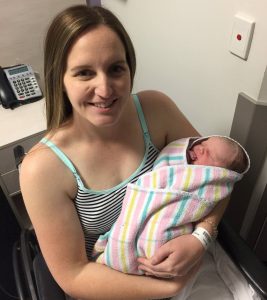 Before answering this question, what is the postnatal period needs to be considered. Postnatal care considerations will vary for each postnatal time period.
Before answering this question, what is the postnatal period needs to be considered. Postnatal care considerations will vary for each postnatal time period.
The postnatal period starts after the third stage of labour (delivery of placenta) has been completed. It can be considered in three time periods:
- Immediately after childbirth while the new mother is still in the birth unit.
- In-patient postnatal period when mother and baby are still in hospital on the postnatal ward.
- After discharge from hospital, which includes the six-week postnatal visit.
Many of the postnatal care considerations while in hospital are attended to by midwifery staff who report any concerns to the obstetrician (or junior medical staff if public patient).
While still in the birth unit
The main considerations in postnatal care are:
- The immediate medical considerations are the basic clinical observations of blood pressure, pulse and temperature and addressing any abnormalities.
- Checking baby’s wellbeing and that there are no obvious congenital anomalies.
- Checking placenta is complete.
- Making sure blood loss is normal and addressing postpartum haemorrhage (excessive bleeding).
- Checking for tearing of the perineum, vagina or labia and suturing as needed. Suturing episiotomy if done.
- Skin-to-skin contact between mother and baby.
- Encouraging baby to latch onto nipple, if the new mother intends to breastfeed. If not breastfeeding administering medication to stop milk coming in.
While the mother is an in-patient on the postnatal ward
The main considerations in postnatal care are:
- The basic clinical observations of blood pressure, pulse and temperature and addressing any abnormalities.
- Monitoring lochia loss (uterine bleeding) and making sure not excessive. If excessive the cause needs to be addressed.
- Making sure uterus is firm and well contracted.
- Making sure healing from any tearing/episiotomy and suturing is satisfactory.
- Checking the Caesarean section skin wound if a Caesarean section delivery.
- Helping new mother with breastfeeding or, if not breastfeeding, with formula preparation. Often there are special nursing staff including lactation nursing specialists for this.
- Helping and educating new mother with baby bathing, changing nappies and other mothercraft issues. Often there are special nursing staff for this.
- Making sure the new mother has no problems with passing urine or opening bowels and if so addressing them.
- Physiotherapy support for pelvic floor muscle exercises and abdominal wall muscle exercises.
- Discussion of the new mother’s childbirth experience.
After discharge from hospital
A child and family health nurse will visit the new mother in her home and check on her and her baby’s wellbeing.
All new mothers are encouraged to make an appointment for a six-week postnatal check. If a private patient this six-week postnatal check will be with the obstetrician who has managed the pregnancy. If a public patient it will be at the hospital postnatal clinic or with their GP doctor.
At the six-week postnatal visit the main considerations in postnatal care are:
- Enquiry about baby’s growth and wellbeing.
- Enquiry about baby feeding.
- Enquiry about the new mother’s bladder function, bowel function, vaginal bleeding, and any other issues that may be relevant. Any problems can be addressed.
- Contraception needs can be addressed.
- A limited physical examination that will vary according to the need. There can be checking of healing of any tears or the episiotomy as relevant. There can be checking of a Caesarean section abdominal wound. If a vaginal delivery there can be checking for prolapse and of pelvic floor tone and support given as to how to strengthen pelvic floor muscles. Cervical cancer screening can be done, if due. There can be checking of rectus muscle separation. Blood pressure can be checked. There can be other checks as needed.
- Discussion of the childbirth experience.
Sometimes there will need to be a postnatal visit prior to the six-week check because of hypertension in pregnancy and discharge on medication, patient concern about heavier than usual vaginal bleeding or about healing, and other concerns.
Care on the newborn baby
Care of the newborn baby is referred to as neonatal or newborn care, not postnatal care. Postnatal care is care of the mother after delivery.
There will be a brief assessment of the baby by the midwife and doctor (if present) immediately after delivery. Baby will later be weighed, and both the length of baby and head circumference of the baby will be recorded. Assuming the baby is more in good condition and there is no concern about baby’s wellbeing after birth or major congenital abnormalities there will not be a detailed check of the baby at this stage.
There will be a detailed check of the baby in the well-baby nursery or in the mother’s postnatal room done by the paediatrician or junior hospital doctor (if public patient). This will be to check baby’s wellbeing and for any congenital abnormalities. There may be extra checks because of family history or problems identified in the pregnancy.
While in hospital baby’s is checked for temperature regulation, respiration, urine output, stool passage, feeding, jaundice, weight loss, lethargy, and hearing. There will be routine newborn screening for phenylketonuria, underactive thyroid, cystic fibrosis, galactosaemia, aminoacidopathies, organic acidaemias and fatty acid oxidation defects.
There should be a six-week newborn assessment with the paediatrician, hospital clinic or GP. At this visit, there will be a physical check of the baby. Baby’s wellbeing will be checked and weight gain assessed. Feeding and any other issues can be discussed and advice given.

